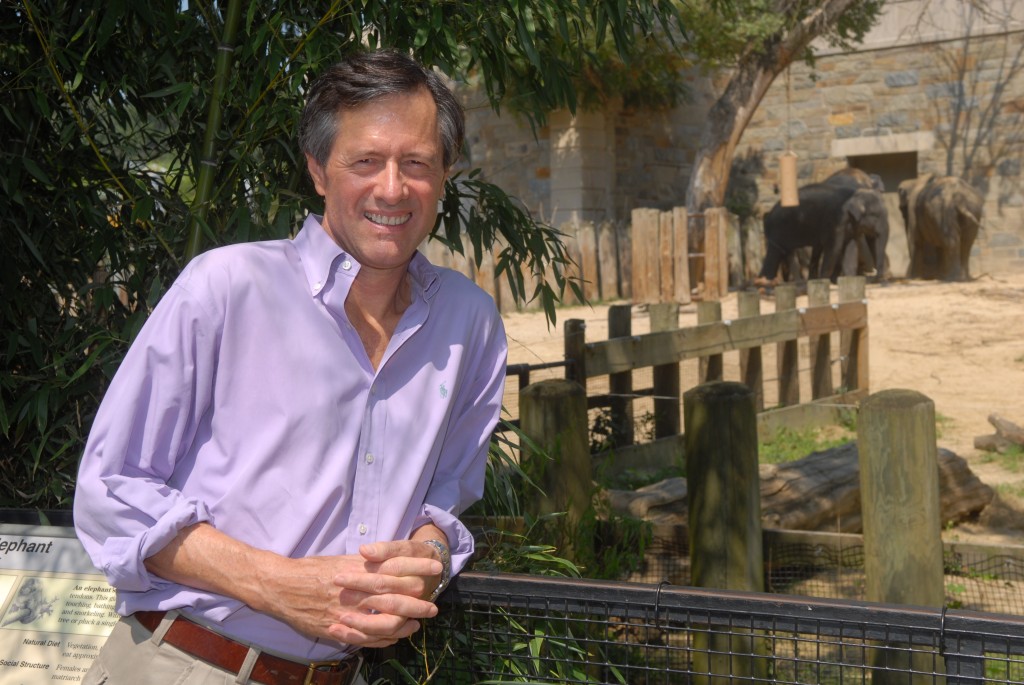
(Photo courtesy Chris Palmer)

(Photo courtesy Chris Palmer)
Chris Palmer, a professor, speaker, author and film producer, always knew that he wanted to start a nonprofit to promote environmental films. This became a reality in 2004 when, after a career that included being an officer in the British Royal Navy, working on Capitol Hill and leading the production division of the National Wildlife Federation, Palmer joined American University as a faculty member in the School of Communication and launched the Center for Environmental Filmmaking.
The Center’s programs range from “Classroom in the Wild,” a one-week offering over spring break in which 14 students travel to the Chesapeake Bay to gain environmental filmmaking experience to various scholarships and prizes that the Center provides to students through the support of Center donors. When deciding to create the Center and become its director, Palmer said he felt there was a need for students to be inspired to produce powerful environmental films, and said that the Center at AU remains one of very few similar institutions found at universities worldwide.
“I started the Center because I think there is a strong need to inspire the next generation to produce films that help people be good stewards of the world,” Palmer said.
One of the programs of the Center is the annual Eco-Comedy video competition, with this spring’s theme being “Conservation and Environmental Protection.” Palmer said that the idea of the competition stems from his passion for environmental activism along with comedy, having been a stand-up comedian in the D.C. area for five years.
“I had been interested in comedy for a long time, and I had been an environmental activist for a long time, so those two things, comedy and environmental activism, come together in the Eco-Comedy video competition,” Palmer said. “The whole point of it is to try and show how humor, comedy, laughter, can be used to advance an environmental agenda.”
The winner of last year’s competition, Julia Schaefer Gomez, is currently a research fellow at the Environmental Protection Agency, in the Office of Water. She said that working on her submission to the contest last year exposed her to filmmaking and the field of environmental communication and played a major role in her realizing her career aspirations.
She thinks the competition should be adopted by more universities, as it gives people a chance to use creativity and humor to reach broad audiences on serious environmental issues and can be a life-changing experience.
“Participating in this competition actually made a difference in my life,” she said. “Obviously, winning the grand prize was great, but more than that, the opportunity and the process of getting to do this – it was validation for me that this is the area I want to be working in.”
Elizabeth Herzfeldt-Kamprath, a graduate student in the School of Communication’s Film and Electronic Media program with a focus on Environmental and Wildlife Filmmaking, is a Center Scholar and a graduate teaching assistant for Palmer, and said that Palmer’s mentoring along with the Center’s regular events that bring in speakers has been of tremendous help to her.
Herzfeldt-Kamprath, currently working on a film being partially funded by the Center, said her project is about a bird rehabilitator who has established a bird sanctuary on the island of St. Croix in the Virgin Islands. The film attempts to show how rehab decisions lead injured birds to recovery and release back into the wild, or kept in captivity and care.
“There are so many critical environmental issues happening right now that are going to dramatically impact the future of our planet, and I think film hasn’t quite figured out as a medium how to best present these ideas, so that is part of the challenge for young environmental filmmakers – we need to figure it out now,” Herzfeldt-Kamprath said.
Center Scholar Kent Wagner is another graduate student pursuing the Environmental and Wildlife Filmmaking concentration. Wagner said that the Center was what brought him to AU, and he sees the role of the Center increasing in years to come.
“I think that the role that the Center for environmental Filmmaking will play in the next five years, or may be ten years, is going to be significant, or has a chance to be significant,” Wagner said. “We need good films being made, now more than ever.”
Wagner is currently working on a film about deforestation on the island of Borneo and its impact on the Dayak people, Borneo’s indigenous population. He traveled to Borneo last summer to work on the project and hopes to return this summer to shoot additional footage. Wagner said that 90 percent of the funding for the film is coming from the Center.
“This project I’m working on would not exist at all if the Center for Environmental Filmmaking did not exist,” Wagner said. “They came to me with this idea and I looked into it and said, ‘yes, this is it’.”
Palmer said that he is proud of the work students are doing through the Center, and people must act now and realize the urgency to protect the environment.
“They (students) are out there doing good work, at a time when there is desperate need for people like them to combat the anti-environmentalism of the new administration,” Palmer said.
Palmer said that what he enjoys most about his work is the opportunity to help students launch their careers and ultimately do meaningful work that creates an impact.
“It is immensely rewarding to help young people who are just starting out, who are eager to get going, who want to grow professionally, who want to make films — who want to make films that make a difference,” Palmer said. “It is so satisfying to help them, to work with them, to give them resources, to help them find jobs, to introduce them to all my contacts, and to give them opportunities.”